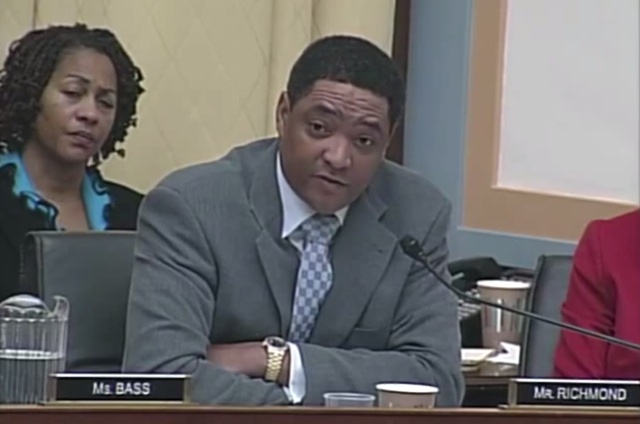
United States House Committee on the Judiciary.
Subcommittee on Courts, Intellectual Property and the Internet Hearing.
Hearing on Section 512 of Title 17, ie, the DMCA.
March, 2014. Washington, DC.
Rep. Tom Marino (R) Pennsylvania: Thank you Chairman, and thank you to the panel members for being here. I hear dozens and dozens of war stories from creators who have come to personally see me, and they’ve shared their nightmares with me, almost exactly the way [Grammy-winning songwriter] Ms. Schneider has genuinely and eloquently stated what she has been going through.
Ms. Oyama, you and I had the opportunity a couple of weeks ago to talk about many issues, this being one of them. And, it was very enlightening, you showed me a lot of what was being done. I guess I’m looking at this from a proactive approach. We talked about the ‘red light green light system’ a little bit, by which a provider would denote in a search, in results, those sites that may have been tagged as likely to contain infringing content, with a yellow or red light and some explanation.
Would you be willing to create with the providers that you can work with, or you at Google, create a method to implement this type of system, and further would you be willing to move these authorized legitimate results to the top of the page?
Katherine Oyama, Senior Copyright Policy Counsel, Google Inc.: I think we always want to have authorized legitimate results appear, we’ve done a lot of great work especially using the signal and other things, working with rights holders to make sure that for the vast majority of queries related to media and entertainment content, the ones I discussed earlier related to films, that the legitimate results are surfacing. I think the ‘red light green light’ concept that we talked about was in the context of kind of flagging for users that sites might be good or might be bad. I think we have to remember that the DMCA applies to all service providers, there may be 66, ya know, thousand or more —
Rep. Marino: — I understand that that, but I’m looking for a solution here.
I’m really not one that wants the federal government to get involved in what it’s involved in now, I’m a state’s rights guy. And I want to see less federal government in my life. But we need to ramp this up a little bit, and I’m looking towards the industry.
I’m having some faith, for the time being, in the industry and providers to come up with methods — and I mean, Google, you’re a smart operation over there, I’m very impressed, but I’m looking to you to create a system whereby people like Ms. Schneider are not damaged as they are.
For example, when someone types in a movie, ‘free,’ can you not do something? I can’t believe you cannot, I think we can. If we can put a man on the moon and transplant a heart, we certainly can say when someone shows up ‘free,’ do something about that.
Help me out, give me some suggestions, please.
Oyama: Yes, okay, so I think we cannot strike the word ‘free’ from search [laughing], because there’s a lot of legitimate great free music and movies and, that’s good for everybody, that’s good for consumers. Some artists, the first thing they want is they want people to know who they are, they want to get their name recognition out. And from there, they use this popularity: songs go viral, they go number one on iTunes, they travel the world. These are good things to have the internet available, to have distribution of music.
I think the key, the key place here that I think we can all continue to work together, is how do we surface legitimate content? So if we want to fight piracy, we need to increase the availability of legitimate offerings –
Rep. Marino: — Yeah, but let — let me stop you there a moment, there’s got to be a process by which when certain things come up free, and I don’t want to have to pay for it. That that can be flagged, and…
Oyama: Yes, yes… One of the places we’ve had some good conversations with folks about is if you want legitimate pages to surface for a query for ‘free,’ the pages should have the word ‘free’. So you could say, ‘free music sample,’ you know, anything with that word ‘free’ that will help it surface. We’re also trying to use additional space in search –
Rep. Marino: – Alight, let me jump to another question –
… later in the hearing.
Rep. Cedric Richmond (D) Louisiana: Thank you Mr. Chairman. Let me just start with you Ms. Oyama. And, you mention the Auto Complete. And, I guess my question is, can [Google] manipulate or manage the Auto Complete because if someone is just going to Google for 12 Years a Slave… [pause]. Once you get to ’12 Years’ and it says ‘free’ or ‘watch for free,’ then you are pushing them to that space even if they didn’t want to go there.
And I’m thinking of my mother, who’s probably not the most internet sophisticated person. So if she goes to Google for 12 Years a Slave, and it automatically says ‘free’, you’re kind of enticing her to go that way.
So can you manipulate Auto Complete at all?
Oyama: I just want to be clear on the interaction between Auto Complete and search results. You can go in and see what users are actually typing in. And you can see that it’s the movies or an artist, and you can go into Google and type those queries in. They are clean results. And on any links that are a problem, we can take them out. There are more than 23 million –
Rep. Richmond: No no, I understand the results. But I’m strictly speaking on Auto Complete.
Oyama: The policy we have , it’s been an ongoing conversation with rights holders. So our policy is we’ll accept terms, if rights holders are concerned these terms are closely associated with piracy. We’ve accepted them, we’ve actually accepted almost every term, almost all the terms we’ve received. But a word like ‘free’ you cannot strike, a word like just ‘music,’ things like that are associated with a lot of legitimate content offerings.
But if [the terms] pass that threshold, there’s been a good amount of coverage, there are definitely terms and words, services that can be removed. And it’s not a finished conversation, so if there are more words that are concerning for folks, there should be an ongoing conversation, there are always new services and bad actors, and we want to keep that updated in real time.
Rep. Richmond: Well then, let me ask your opinion on something. I represent New Orleans, which is a hotbed of creativity, whether it’s independent filmmakers, whether it’s musicians, and, whether it’s small authors who self-publish. What advice would you give them in terms of protecting their copyright considering they’re probably not a big corporation and they’re just someone who loves music and would like to earn a living singing whatever they’re singing about.
I would just ask that you use your legal mind and pretend that the artist is your client, and how you would advise them to protect their copyright. And insure that others are not making money off of that, especially when you look at the investment that people put out and life savings. We don’t want people to just come and take their material.
So let me just say, and, especially with my time in the state legislature that, you know [pause].
